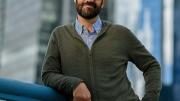As a child, urbanist Bruno Carvalho explored his native Rio de Janeiro in search of four things: soccer, books, films, and music. The city bus took Carvalho, now a professor of romance languages and literatures and co-director of the Harvard Mellon Urban Initiative, everywhere he needed to go: to empty fields, sandy beaches, and the Maracanã Stadium for soccer; to Rio’s numerous used bookstores, where he got an “early education in the canon of Brazilian poetry”; and to the “serendipitous social spaces” of video rental stores and record shops. “I sort of became an urbanist without realizing it, learning the rhythms of cities,” he says. Walking the streets of Rio, he would recognize workers in stores and restaurants and know when each profession got off work. The study of cities came into focus for him at Dartmouth College, where he met his architect wife. They began “building-watching” for fun. “We joined forces,” he says, combining her design knowledge with his urban-planning expertise to “try to figure out” new cities: “Every building is a puzzle for us.” Like his hometown of Rio, bordered by rainforest, Carvalho’s recent work lies at the intersection of the urban and the environmental—a natural launching point for his New York Times op-eds denouncing deforestation of the Amazon. Now, when not chasing his three-year-old daughter or putting her to sleep with João Gilberto bossa nova records, he’s working on a book about how people have imagined urban futures since the 1790s. The project requires the kind of synthesis inherent to urban studies (and one he finds continually inspiring), unifying his disparate interests like music, film, and the environment. “They all come together in the city,” he says. “They came together in the city for me as a child, and they still do today.”
Bruno Carvalho
Bruno Carvalho
An urbanist’s lifelong study of the “rhythm of cities,” from Rio to Cambridge

Bruno Carvalho
Photograph by Jim Harrison
You might also like
Former Homeland Security Chief Says ICE and CBP Have “Lost Their Way”
At Kennedy School talk, Jeh Johnson advocates restructuring “outdated” DHS.
Open Book: A New Nuclear Age
Harvard historian Serhii Plokhy’s latest book looks at the rising danger of a new arms race.
Harvard Symposium Tackles 400 Years of Homelessness in America
Professors explore the history of homelessness in the U.S., from colonial poor laws to today’s housing crisis
Most popular
Explore More From Current Issue

How a Harvard and Lesley Group Broke Choir Singing Wide Open
Cambridge Common Voices draws on principles of universal design.

At Harvard’s Beck-Warren House, Ghosts Speak Many Languages
The quirky 1833 home now hosts Celtic scholars.

The Enterprise Research Campus in Allston Nears Completion
A hotel, restaurants, and other retail establishments are open or on the way.





